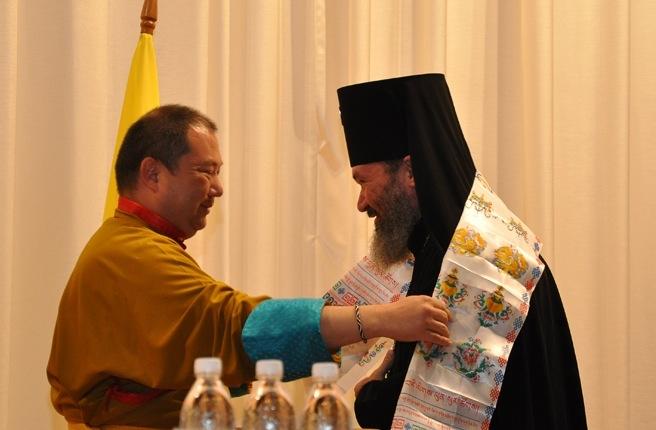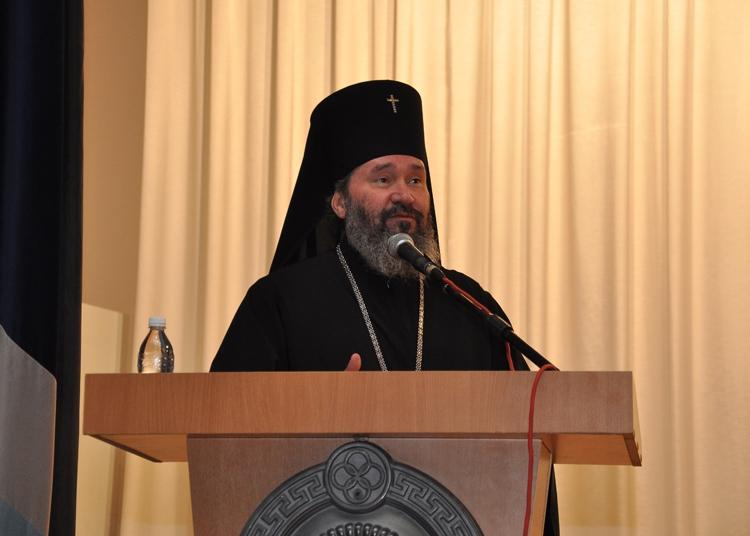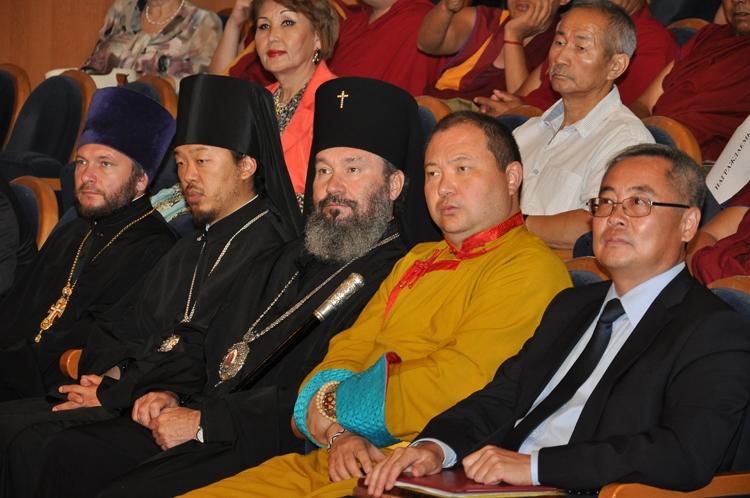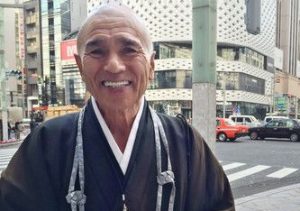
I am not qualified to be a theologian, although I share with many of my former teachers and fellow students of religion a belief in interfaith dialogue. The objective of interfaith dialogue is to discern parallels and affinities (but emphatically not to impose similarities) in order to build closer friendships between the great religious traditions. To do this, interfaith writers deploy a discipline called comparative theology to facilitate a discussion between the doctrines and texts of those traditions. Similitudes (and even disagreements) that arise from such studies can be fertile ground for planting rapport and respect.
On 23 September, I attended a meeting of the Interreligious Council of Kalmykia (of which the leader of Kalmyk Buddhists, Telo Tulku Rinpoche, is a member) in the republic’s capital of Elista.* It was only recently that Russian Orthodox Christianity and Buddhism were able to rebuild themselves in Kalmykia, which saw horrific destruction of religious institutions under the excesses of Soviet rule. September’s meeting was held to commemorate the 20th anniversary of the Orthodox eparchy in Kalmykia, and the concurrent 10th anniversary of the completion of the Golden Abode of Shakyamuni, the largest and most important Buddhist temple in Europe. This meeting gathered Buddhist, Russian Orthodox, and Muslim representatives from Russia’s three Buddhist republics (Kalmykia, Tuva, and Buryatia). Archbishop Justinian of Naro-Fominsk, the ruling bishop of the Diocese of Elista and Kalmykia, made a point that was particularly poignant for those assembled: “We all complete each other. We can be assured that we’ve preserved our faith, doctrines, and canons. We saved our religions without mixing them, and at the same time we’ve all remained friends.”
This meeting was only one of several encouraging trends. In Europe and the US, Buddhist-Christian dialogue has taken a very positive turn since the Second World War. Decolonization in Asia led to the establishment of what I call “discussions in good faith” after the much more adversarial encounters between Buddhists and Christians in the days of European imperialism. Since the 1960s, this phase of goodwill has been dominated by the denominations of Western Christianity (Roman Catholicism and Protestantism), denominations whose contact with Buddhism was facilitated by the former seafaring empires of the UK and France. Aside from the attention garnered by popular figures like Thich Nhat Hanh and Thomas Merton, there are numerous monographs and academic journals exploring Buddhist-Christian dialogue, like the Journal of Buddhist-Christian Studies. Common topics include: differences between the ways in which love, compassion, and ethical practices are conceived in Christianity and Buddhism; Buddhist responses to Christian teachings like Trinitarian doctrine; parallels between Christ’s self-emptying (kenosis) and Buddhist self-lessness (anatman); and Christian responses to Buddhist insight (prajna) and enlightenment.

However, given the rich interaction between the Russian Orthodox Church and Buddhism over the centuries, it is a pity and waste that we Buddhists have few chances to meet, discuss, and share with thinkers of the Eastern Orthodox Church (which encompasses the Russian Orthodox Church). Bartholomew I of Constantinople, the Ecumenical Patriarch, believes that Orthodox Christianity and Buddhism can learn from each other. Orthodox theologian Olivier Clément notes that Bartholomew I stated that Buddhist meditation “allows us to discern the process of growth and finally to awaken ourselves. . . . And the methods to achieve this liberation from the ‘passions’ are similar [in Hesychastic spirituality, a mystical tradition of still prayer in the Eastern Orthodox Church]: cleanse the mind of ‘thoughts’, achieve apatheia (passionlessness) and ‘wakefulness’. This last word is as important in hesychasm as it is in Buddhism, because the word buddha means ‘awake’” (Clément 1997, 220–21). Bartholomew I also said: “According to Buddhism, the person does not exist. The Christian, however, affirms the existence of the person. But Orthodoxy does not identify the person with the individual, with the ‘individual substance of a rational nature.’ . . . [And precisely here] the efforts of Hinduism and Buddhism can be helpful for us” (Clément 1997, 221–23).
In a recent, more systematic article called “‘The Language of Fullness and the Language of Emptiness.’ Dialogue Between the Russian Orthodox Church and Buddhism? A Paradox,” Leuven professor emeritus of Russian literature Ton Lathouwers presented persuasive evidence and arguments in favor of a narrative of “remarkable similarities between Orthodox religion and the East.” Although he quotes many Japanese and Russian thinkers throughout his study, his reference to Catholic theologian Thomas Ohm and Russian Orthodox archpriest V. V. Zen’kovskii is particularly pertinent: both “point to the fact that the Asian religions as well as Eastern Christianity have great difficulty with the over-valuing of the rational approach in Western Christian theology. Furthermore, both accuse Western Christianity of emphasizing the transcendent nature of God, neglecting His immanence” (Lathouwers 2014, 383).
The Interreligious Council of Kalmykia focuses on social, political, and cultural advocacy. However, if Buddhism and Russian Orthodox Christianity can form a united front on social and political issues, there is no reason why comparative theology cannot be part of a holistic project of friendship-building. As Lathouwers pointed out above, apparent differences between Eastern Christianity and Western Christianity might highlight similarities between the former and Buddhism. While the life of the Russian Orthodox disciple is grounded in the creeds and councils that the Church confesses to, conformity to those creeds is not as important as consistency with “living biblically” as taught by the Bible, the fathers of the Eastern Church, and liturgy. Similarly, while a correct understanding of Buddhist doctrines is critical, the experience of insight through nonattached wisdom (prajna) and ethical living takes precedence over what the Zen schools in particular caution as intellectualization and reification.

Both Russian Orthodoxy and the Buddhist schools emphasize the experiential over the dogmatic. Inner transformation takes top priority. Ironically, this has led to a critique aimed at both traditions by Western Christianity: that neither Buddhism nor Russian Orthodoxy gives enough emphasis to social justice and societal transformation. There is great potential on this front to mount a counter-narrative together.
A broadly shared concept between our two traditions is the binary of natural and unnatural living. In Buddhism, the most important liberating experience is insight, which frees us from the falsehood of samsara. In Eastern Orthodox Christianity, Original Sin or Adam’s fall isn’t seen as a state of guilt or alienation from God (which is the common view in the Augustinian theology of the West), but an unnatural state of being which ends in death: in this respect, death is seen as the result of an illusory way of existence. In a striking resemblance to the reasoning of Buddhist ideals about samsara, the “circle of life and death” is a false mode of being. It is ended by participation in the death and resurrection of Christ, the insight into life unbound by mortality. In a similar way, Buddhism sees our conventional method of living as an unnatural illusion brought about by ignorance, and that life and death in this world can be transcended.
Finally, both traditions lean towards apophatic language. There is a striking concordance in spirit, if not in expression, between Orthodox Christianity and Buddhism about the inexpressibility of the transcendent or divine. This is not to say that God is unknowable (God has revealed himself through the Trinity and his acts), nor that enlightenment is inexpressible (the Buddha spent most of his life articulating the nature of nirvana). However, both argue that the true nature of the transcendent is better experienced than endlessly verbalized or argued about.

As with every project in comparative theology, caution and patience are needed in order to respect the differences of each tradition. They function as critical bulwarks against erroneous parallels or connections. However, Lathouwers is right when he concludes in his article (which I recommend as a good starting point for discussion): “Against the background of these similarities the absence of a living dialogue between the two religious traditions that, from within, share such striking commonalities with each other, is even more distressing. It is a real paradox in Russian Orthodoxy. We can only hope for an opening here” (Lathouwers 2014, 384).
I have tried to add to Lathouwers’s and others’ work with some broad rubrics that demonstrate the possibilities of reflecting creatively but cautiously on the potential spiritual affinity between our traditions. There seems no reason to believe that the Russian Orthodox Church cannot enjoy an affinity with Buddhism, where we bear each other’s heart and soul to one another, embracing all that is similar—and different—about us.
* The purpose of the council is to maintain interreligious and interethnic harmony and prevent ethnic and religious conflicts. Founded by Kalmykian Buddhists, the Russian Orthodox Eparchy of Kalmykia, and the Kalmykian Islamic spiritual administration, the council holds yearly conferences and brainstorms ways to consolidate traditional spiritual values in Russian society. Some of their activities are: preventing youth crime, promoting culture and education, and lobbying for family values and the preservation of historical and artistic heritage.
References
Clément, Olivier. 1997. Conversations With Ecumenical Patriarch Bartholomew I. New York: Crestwood.
Lathouwers, Ton. 2014. “‘The Language of Fullness and the Language of Emptiness.’ Dialogue Between the Russian Orthodox Church and Buddhism? A Paradox.” In Orthodox Paradoxes: Heterogeneities and Complexities in Contemporary Russian Orthodoxy, edited by Katya Tolstaya, 368–87. Leiden: Brill.







